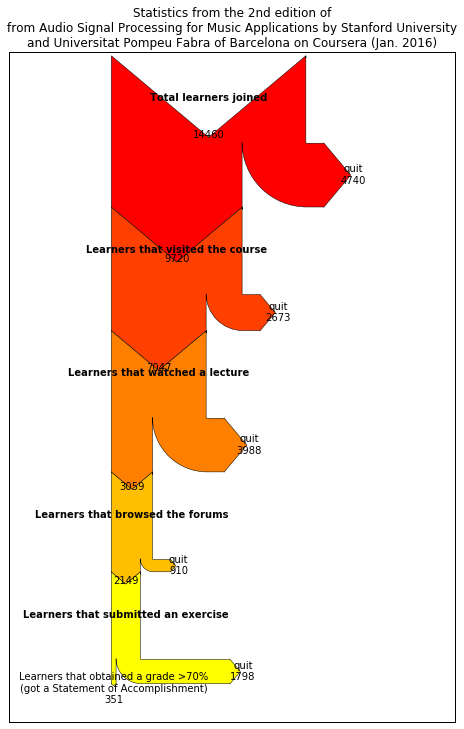2015, Year of the MOOC?
During the year 2015, I've participated in four different MOOCs. All of them where hosted on Coursera, one of the leading platforms for MOOCs (Massive Online Open Classes). The four MOOCs were (in the order I took them):
- Learning How to Learn: Powerful mental tools to help you master tough subjects: accomplishment 99.4% with distinction.
- Machine Learning: accomplishment 100%.
- Developing Your Musicianship: accomplishment 100%.
- Audio Signal Processing for Music Applications: accomplishment 94.4%, with distinction.
In this post, I'd like to take the time to write what I think was really great about them, what I didn't like too much and some thoughts about the learning process.
So, is it possible to learn using MOOCs?
I graduated from College 5 years ago. Since then, I had been learning on my own. Going back to MOOCs, I was a little scared that this would look a lot like classes in university. It turns out that I was positively surprised by the MOOC format: mostly short videos, with questions popping up during the videos, forums to discuss, assignments with deadlines and accurate evaluation criteria. The most important conclusion for me is: MOOCs are a great way to learn something. I believe the things I worked on during these classes turned into solid knowledge, as good as it can be from other sources.
Is it easy to take MOOCs?
I believe the answer to that question is no. MOOCs are hard, for several reasons. One of my personal takeaways from my year of MOOCs is that the most critical aspect to success with these is the time you can put into them. As a full-time employee, it's not easy to set the many hours per week required for each course aside. I'm lucky to have a regular transportation schedule, which made taking time predictable (even if it was hard, due to the fact that I mostly watched lectures in the bus in the evening, after work). It cannot be stressed enough that taking a MOOC is often a 10 week commitment. This can get hairy with holidays, weekend trips and homework assignments that take longer than expected. My personal rule is: if you don't have the time, don't commit to taking a MOOC.
The statistics for the MOOC Audio Signal Processing for Audio Applications I finished in January 2016 are:
- Total learners joined: 14,460
- Learners that visited the course: 9,720
- Learners that watched a lecture: 7,047
- Learners that browsed the forums: 3,059
- Learners that submitted an exercise: 2,149
- Learners that obtained a grade >70% (got an Statement of Accomplishment): 351
I made an illustration to convey a graphical intuition of this in the form of a Sankey diagram:

So, to sum this section up, MOOCs are hard. Few finish them the way they're meant (2% in the above case). It takes determination and time.
Does this make a difference in my career?
As far as I can tell, the MOOCs I have taken haven't made a difference in my career so far. They have made a difference in my technical skills. The two technical courses I took, machine learning and signal processing, have greatly improved my abilities in terms of understanding these two sciences. I can't say how grateful I am after taking these, because they deepened some understanding that had gotten stuck since university. Also, I really see these courses as a motor for curiosity: taking machine learning has inspired me to read technical papers, work on extremely nice little side projects (this one for instance) and will probably allow me to stay in sync with the next developments in artificial intelligence, which might come around in the next decades.
Lessons learned
To sum up my experiences, these are the things I'd recommend to people thinking about taking MOOCs:
- If you don't have the time to take the classes over the full span of the course, don't commit to the class. You'll be frustrated if you drop out or if you follow all lectures but realize you didn't grasp some of the basics due to lack of time.
- Most courses are video: watch all the material, and take notes that sum up your understanding after each video. This will help your learning.
- Do the quizzes. Take them again until you reach 100%. This is a key to understanding the material.
- Do your homework. All of it. Fight to get 100%.
- Talk about it with your friends, coworkers, family. Sharing helps you put the things you learn into perspective.
- Actually, I'd recommend taking the Learning how to Learn course before taking any other MOOC. It's a wonderful course.
Where to, from here?
As taking MOOCs takes a lot of time, I will probably take less of them in 2016. Hopefully, my side projets will improve thanks to the great material I've had the chance to learn in 2015. Because one of the most amazing things is that all of this education comes for free, provided you bring in the effort to master it.